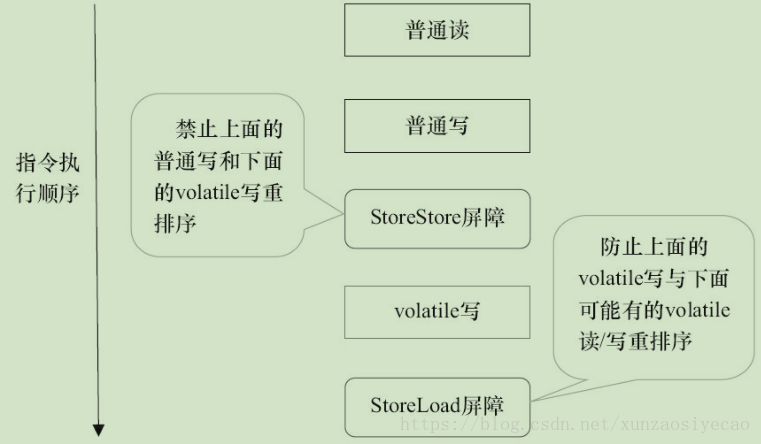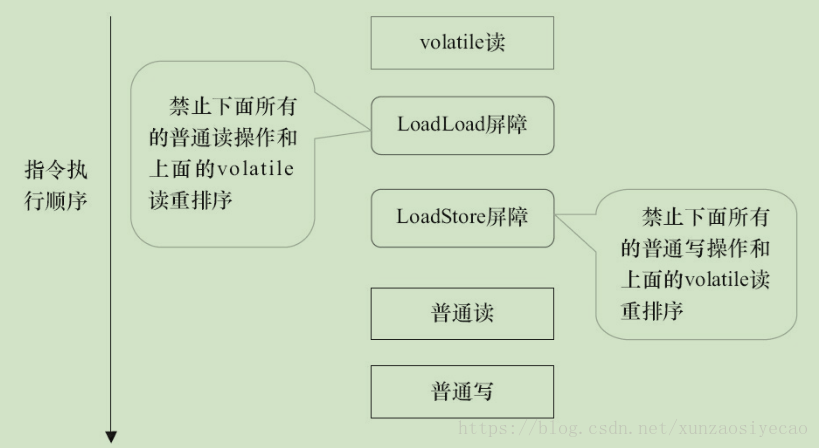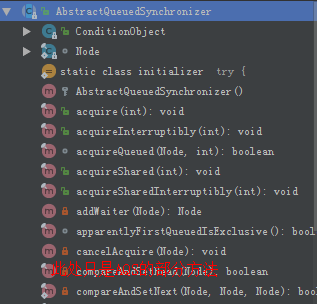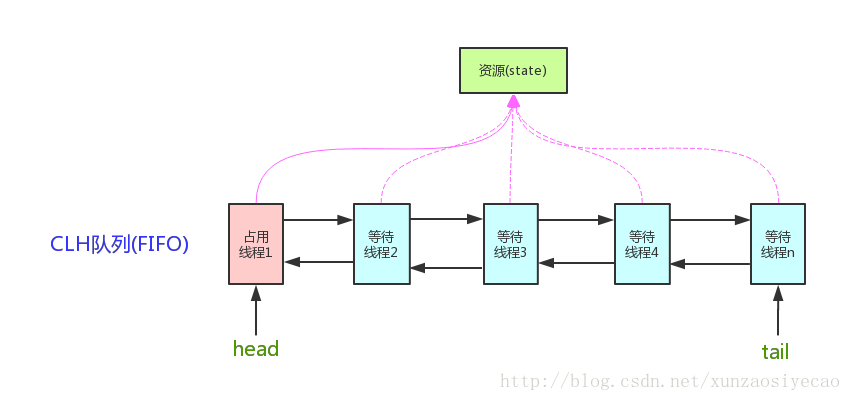本文整理自:《MySQL技术内幕:InnoDB存储引擎》 第二版
作者:姜承尧
出版时间:2013-05
在满足业务需求的前提下,代码、架构,越简单,越稳定。
集群规模:Elasticsearch集群数10+,单集群数据量30T左右。
当你在浏览器中输入 google.com 并且按下回车之后发生了什么?
整理自 https://github.com/skyline75489/what-happens-when-zh_CN
提到volatile首先想到就是:
到这里大家感觉自己对volatile理解了吗?
如果理解了,大家考虑这么一个问题:ReentrantLock(或者其它基于AQS实现的锁)是如何保证代码段中变量(变量主要是指共享变量,存在竞争问题的变量)的可见性?
1 | private static ReentrantLock reentrantLock = new ReentrantLock(); |
既然提到了可见性,那就先熟悉几个概念:
JMM:Java Memory Model 即 Java 内存模型
The Java Memory Model describes what behaviors are legal in multithreaded code, and how threads may interact through memory.
It describes the relationship between variables in a program and the low-level details of storing and retrieving them to and from memory or registers in a real computer system.
It does this in a way that can be implemented correctly using a wide variety of hardware and a wide variety of compiler optimizations.
Java内存模型的主要目标是定义程序中各个变量的访问规则,即在虚拟机中将变量存储到内存和从内存中取出变量这样的底层细节。此处的变量主要是指共享变量,存在竞争问题的变量。Java内存模型规定所有的变量都存储在主内存中,而每个线程还有自己的工作内存,线程的工作内存中保存了该线程使用到的变量的主内存副本拷贝,线程对变量的所有操作(读取、赋值等)都必须在工作内存中进行,而不能直接读写主内存中的变量(根据Java虚拟机规范的规定,volatile变量依然有共享内存的拷贝,但是由于它特殊的操作顺序性规定——从工作内存中读写数据前,必须先将主内存中的数据同步到工作内存中,所有看起来如同直接在主内存中读写访问一般,因此这里的描述对于volatile也不例外)。不同线程之间也无法直接访问对方工作内存中的变量,线程间变量值得传递均需要通过主内存来完成。
在执行程序时,为了提高性能,编译器和处理器常常会对指令做重排序。重排序分3种类型:
从Java源代码到最终实际执行的指令序列,会分别经历下面3种重排序:

对于编译器,JMM的编译器重排序规则会禁止特定类型的编译器重排序(不是所有的编译器重排序都要禁止)。对于处理器重排序,JMM的处理器重排序规则会要求Java编译器在生成指令序列时,插入特定类型的内存屏障(Memory Barriers,Intel称之为Memory Fence)指令,通过内存屏障指令来禁止特定类型的处理器重排序。
JMM属于语言级的内存模型,它确保在不同的编译器和不同的处理器平台之上,通过禁止特定类型的编译器重排序和处理器重排序,为程序员提供一致的内存可见性保证。
两个操作之间具有happens-before关系,并不意味着前一个操作必须要在后一个操作之前执行!happens-before仅仅要求前一个操作(执行的结果)对后一个操作可见,且前一个操作按顺序排在第二个操作之前(the first is visible to and ordered before the second)。
从JSR-133开始(即从JDK5开始),volatile变量的写-读可以实现线程之间的通信。
从内存语义的角度来说,volatile的写-读与锁的释放-获取有相同的内存效果:
volatile仅仅保证对单个volatile变量的读/写具有原子性,而锁的互斥执行的特性可以确保对整个临界区代码的执行具有原子性。在功能上,锁比volatile更强大;在可伸缩性和执行性能上,volatile更有优势。
volatile变量自身具有下列特性:
volatile写和volatile读的内存语义:
JMM针对编译器制定的volatile重排序规则表

为了实现volatile的内存语义,编译器在生成字节码时,会在指令序列中插入内存屏障来禁止特定类型的处理器重排序。对于编译器来说,发现一个最优布置来最小化插入屏障几乎是不可能的。为此,JMM采取保守策略。下面是基于保守策略的JMM内存屏障插入策略。
LoadLoad屏障:对于这样的语句Load1; LoadLoad; Load2,在Load2及后续读取操作要读取的数据被访问前,保证Load1要读取的数据被读取完毕。
StoreStore屏障:对于这样的语句Store1; StoreStore; Store2,在Store2及后续写入操作执行前,保证Store1的写入操作对其它处理器可见。 LoadStore屏障:对于这样的语句Load1; LoadStore; Store2,在Store2及后续写入操作被刷出前,保证Load1要读取的数据被读取完毕。
StoreLoad屏障:对于这样的语句Store1; StoreLoad; Load2,在Load2及后续所有读取操作执行前,保证Store1的写入对所有处理器可见。它的开销是四种屏障中最大的。在大多数处理器的实现中,这个屏障是个万能屏障,兼具其它三种内存屏障的功能。
上述内存屏障插入策略非常保守,但它可以保证在任意处理器平台,任意的程序中都能得到正确的volatile内存语义。
下面是保守策略下,volatile写插入内存屏障后生成的指令序列示意图.

图中的StoreStore屏障可以保证在volatile写之前,其前面的所有普通写操作已经对任意处理器可见了。这是因为StoreStore屏障将保障上面所有的普通写在volatile写之前刷新到主内存。
这里比较有意思的是,volatile写后面的StoreLoad屏障。此屏障的作用是避免volatile写与后面可能有的volatile读/写操作重排序。因为编译器常常无法准确判断在一个volatile写的后面是否需要插入一个StoreLoad屏障(比如,一个volatile写之后方法立即return)。为了保证能正确实现volatile的内存语义,JMM在采取了保守策略:在每个volatile写的后面,或者在每个volatile读的前面插入一个StoreLoad屏障。从整体执行效率的角度考虑,JMM最终选择了在每个volatile写的后面插入一个StoreLoad屏障。因为volatile写-读内存语义的常见使用模式是:一个写线程写volatile变量,多个读线程读同一个volatile变量。当读线程的数量大大超过写线程时,选择在volatile写之后插入StoreLoad屏障将带来可观的执行效率的提升。从这里可以看到JMM在实现上的一个特点:首先确保正确性,然后再去追求执行效率。
下面是在保守策略下,volatile读插入内存屏障后生成的指令序列示意图:
图中的LoadLoad屏障用来禁止处理器把上面的volatile读与下面的普通读重排序。LoadStore屏障用来禁止处理器把上面的volatile读与下面的普通写重排序。
上述volatile写和volatile读的内存屏障插入策略非常保守。在实际执行时,只要不改变volatile写-读的内存语义,编译器可以根据具体情况省略不必要的屏障。
对于AQS需要了解这么几点:
AQS 详解参见:面试必备:Java AQS 实现原理(图文)分析
以公平锁为例,看看 ReentrantLock 获取锁 & 释放锁的关键代码:
1 | /** |
通过ReentrantLock实例调用lock()、unlock()时,acquires、releases的值都是1。
公平锁在释放锁的最后写volatile变量state,在获取锁时首先读这个volatile变量。根据volatile的happens-before规则,释放锁的线程在写volatile变量之前可见的共享变量,在获取锁的线程读取同一个volatile变量后将立即变得对获取锁的线程可见。从而保证了代码段中变量(变量主要是指共享变量,存在竞争问题的变量)的可见性。
如果我们仔细分析concurrent包的源代码实现,会发现一个通用化的实现模式。
前文我们提到过,编译器不会对volatile读与volatile读后面的任意内存操作重排序;编译器不会对volatile写与volatile写前面的任意内存操作重排序。组合这两个条件,意味着为了同时实现volatile读和volatile写的内存语义,编译器不能对CAS与CAS前面和后面的任意内存操作重排序。
推荐阅读:
https://jiankunking.com/java-volatile-keyword.html
本文参考:
1、《Java并发编程的艺术》 方腾飞 魏鹏 程晓明 著
本文分析基于JDK 9
AQS:AbstractQueuedSynchronizer
贯穿全文的图(核心):

模板方法设计模式:定义一个操作中算法的骨架,而将一些步骤的实现延迟到子类中。

等待队列是CLH(Craig, Landin, and Hagersten)锁队列。
通过节点中的“状态”字段来判断一个线程是否应该阻塞。当该节点的前一个节点释放锁的时候,该节点会被唤醒。

1 | private transient volatile Node head; |
AQS维护了一个volatile int state(代表共享资源)和一个FIFO线程等待队列(多线程争用资源被阻塞时会进入此队列)。
state的访问方式有三种:
AQS定义两种资源共享方式:Exclusive(独占,只有一个线程能执行,如ReentrantLock)和Share(共享,多个线程可同时执行,如Semaphore/CountDownLatch)。
不同的自定义同步器争用共享资源的方式也不同。自定义同步器在实现时只需要实现共享资源state的获取与释放方式即可,至于具体线程等待队列的维护(如获取资源失败入队/唤醒出队等),AQS已经在顶层实现好了。
自定义同步器实现时主要实现以下几种方法:
以ReentrantLock为例,state初始化为0,表示未锁定状态。A线程lock()时,会调用tryAcquire()独占该锁并将state+1。此后,其他线程再tryAcquire()时就会失败,直到A线程unlock()到state=0(即释放锁)为止,其它线程才有机会获取该锁。当然,释放锁之前,A线程自己是可以重复获取此锁的(state会累加),这就是可重入的概念。但要注意,获取多少次就要释放多么次,这样才能保证state是能回到零态的。
再以CountDownLatch以例,任务分为N个子线程去执行,state也初始化为N(注意N要与线程个数一致)。这N个子线程是并行执行的,每个子线程执行完后countDown()一次,state会CAS减1。等到所有子线程都执行完后(即state=0),会unpark()主调用线程,然后主调用线程就会从await()函数返回,继续后续动作。
一般来说,自定义同步器要么是独占方法,要么是共享方式,他们也只需实现:
中的一种即可。
当然AQS也支持自定义同步器同时实现独占和共享两种方式,如ReentrantReadWriteLock。
以下部分来自源码注释:
每次进入CLH队列时,需要对尾节点进入队列过程,是一个原子性操作。在出队列时,我们只需要更新head节点即可。在节点确定它的后继节点时, 需要花一些功夫,用于处理那些,由于等待超时时间结束或中断等原因, 而取消等待锁的线程。
节点的前驱指针,主要用于处理,取消等待锁的线程。如果一个节点取消等待锁,则此节点的前驱节点的后继指针,要指向,此节点后继节点中,非取消等待锁的线程(有效等待锁的线程节点)。
我们用next指针连接实现阻塞机制。每个节点均持有自己线程,节点通过节点的后继连接唤醒其后继节点。
CLH队列需要一个傀儡结点作为开始节点。我们不会再构造函数中创建它,因为如果没有线程竞争锁,那么,努力就白费了。取而代之的方案是,当有第一个竞争者时,我们才构造头指针和尾指针。
线程通过同一节点等待条件,但是用另外一个连接。条件只需要放在一个非并发的连接队列与节点关联,因为只有当线程独占持有锁的时候,才会去访问条件。当一个线程等待条件的时候,节点将会插入到条件队列中。当条件触发时,节点将会转移到主队列中。用一个状态值,描述节点在哪一个队列上。
1 | static final class Node { |
waitStatus不同值含义:
该状态值为了简便使用,所以使用了数值类型。非负数值意味着该节点不需要被唤醒。所以,大多数代码中不需要检查该状态值的确定值。
一个正常的Node,它的waitStatus初始化值是0。如果想要修改这个值,可以使用AQS提供CAS进行修改。
在锁的获取时,并不一定只有一个线程才能持有这个锁(或者称为同步状态),所以此时有了独占模式和共享模式的区别,也就是在Node节点中由nextWaiter来标识。比如ReentrantLock就是一个独占锁,只能有一个线程获得锁,而WriteAndReadLock的读锁则能由多个线程同时获取,但它的写锁则只能由一个线程持有。
1 | //忽略中断的(即不手动抛出InterruptedException异常)独占模式下的获取方法。 |
该方法首先尝试获取锁(tryAcquire(arg)的具体实现定义在了子类中),如果获取到,则执行完毕,否则通过addWaiter(Node.EXCLUSIVE), arg)方法把当前节点添加到等待队列末尾,并设置为独占模式。
1 | private Node addWaiter(Node mode) { |
如果tail节点为空,执行enq(node);重新尝试,最终把node插入.在把node插入队列末尾后,它并不立即挂起该节点中线程,因为在插入它的过程中,前面的线程可能已经执行完成,所以它会先进行自旋操作acquireQueued(node, arg),尝试让该线程重新获取锁!当条件满足获取到了锁则可以从自旋过程中退出,否则继续。
1 | final boolean acquireQueued(final Node node, int arg) { |
如果没获取到锁,则判断是否应该挂起,而这个判断则得通过它的前驱节点的waitStatus来确定:
1 | private static boolean shouldParkAfterFailedAcquire(Node pred, Node node) { |
最后,我们对获取独占式锁过程对做个总结:
AQS的模板方法acquire通过调用子类自定义实现的tryAcquire获取同步状态失败后->将线程构造成Node节点(addWaiter)->将Node节点添加到同步队列对尾(addWaiter)->节点以自旋的方法获取同步状态(acquirQueued)。在节点自旋获取同步状态时,只有其前驱节点是头节点的时候才会尝试获取同步状态,如果该节点的前驱不是头节点或者该节点的前驱节点是头节点单获取同步状态失败,则判断当前线程需要阻塞,如果需要阻塞则需要被唤醒过后才返回。
获取锁的过程:
既然是释放,那肯定是持有锁的该线程执行释放操作,即head节点中的线程释放锁.
AQS中的release释放同步状态和acquire获取同步状态一样,都是模板方法,tryRelease释放的具体操作都有子类去实现,父类AQS只提供一个算法骨架。
1 | public final boolean release(int arg) { |
过程:首先调用子类的tryRelease()方法释放锁,然后唤醒后继节点,在唤醒的过程中,需要判断后继节点是否满足情况,如果后继节点不为空且不是作废状态,则唤醒这个后继节点,否则从tail节点向前寻找合适的节点,如果找到,则唤醒。
释放锁过程:
java.util.concurrent中的很多可阻塞类(比如ReentrantLock)都是基于AQS来实现的。AQS是一个同步框架,它提供通用机制来原子性管理同步状态、阻塞和唤醒线程,以及维护被阻塞线程的队列。
JDK中AQS被广泛使用,基于AQS实现的同步器包括:
每一个基于AQS实现的同步器都会包含两种类型的操作,如下:
基于“复合优先于继承”的原则,基于AQS实现的同步器一般都是:声明一个内部私有的继承于AQS的子类Sync,对同步器所有公有方法的调用都会委托给这个内部子类。
后面会推出以下有关AQS的文章,已加深对于AQS的理解
多个线程同时取争取一个锁(在争取之前资源未被锁定),这时候如何保证,只有一个人能获取到?
下面以非公平锁来看一下
1 | /** |
从代码中可以看出通过compareAndSetState来保证只会有一个线程获取到锁。
Unsafe.park和Unsafe.unpark的底层实现原理
在Linux系统下,是用的Posix线程库pthread中的mutex(互斥量),condition(条件变量)来实现的。
mutex和condition保护了一个_counter的变量,当park时,这个变量被设置为0,当unpark时,这个变量被设置为1。
park函数是将当前调用Thread阻塞,而unpark函数则是将指定线程Thread唤醒。
与Object类的wait/notify机制相比,park/unpark有两个优点:
区别是:notify随机唤醒一个线程,notifyAll唤醒所有等待的线程,增加了灵活性
可以参考下这个:
https://xiaomi-info.github.io/2020/03/24/synchronized/
本文很多内容整理自网络,参考文献:
https://segmentfault.com/a/1190000011376192
https://segmentfault.com/a/1190000011391092
https://zhuanlan.zhihu.com/p/27134110
https://blog.csdn.net/wojiaolinaaa/article/details/50070031
https://www.cnblogs.com/waterystone/p/4920797.html
本文整理自:《图解TCP/IP 第5版》
作者:[日] 竹下隆史,[日] 村山公保,[日] 荒井透,[日] 苅田幸雄 著
译者:乌尼日其其格
出版时间:2013-07